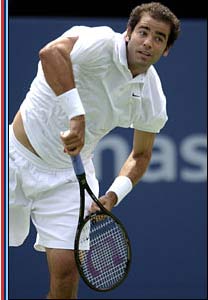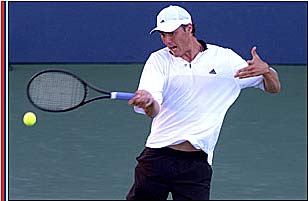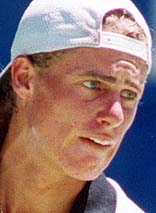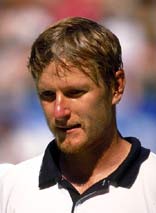|
Features
Pete Sampras versus Marat SafinBoth players are on the revival train. They continue to benefit from the emotional memories associated with the US Open, with Safin forgetting a dismal year to make a run at the title. Andre Agassi astutely noted that players have a psychological advantage at events they once won, in line with my previous article on Muscle Memories. Since both players are appearing to benefit from the "high" associated with past US Opens, who will come out on top? Pete SamprasPete has made an incredible run, culminating with his fantastic win over Agassi. However, against Agassi he faced a player he can still overpower off the serve as well as set up points and close them out with a big groundstroke or volley. Knowing you can overpower an opponent is a big confidence booster. It remains to be seen whether Sampras can play the power tennis he needs to on his serve against Safin to stay in control of the match. Much will depend on his first serve percentage. Once rallies commence the odds of Pete winning the points will go down, especially against an opponent eager to reestablish himself and show his victory last year was not a fluke. On the other hand Sampras is as motivated as ever to prove he is still a top player and it is doubtful he will be as surprised by Safin's firepower as he was last year. Consequently he should be ready for everything and should have a well rehearsed game-plan to contend with the young Russian. Since Pete is in a very good psychological state he should play his best tennis tomorrow.
Marat SafinAlthough Safin is portrayed as a difficult player to work with, one should not overlook the fact that he has been dogged with nagging injuries that have affected his play all year long. Since he's back in form at this year's Open, look for him to play a good match especially if he gets on top early. However, should Sampras get on top, Safin's questionable determination will be crucial to any comeback attempt. He has been known to roll over even in big tournaments. Last year he was so dominating that his psyche never was really tested. ForecastI give Pete the pre-match mental edge. I also think Sampras will win
should the match be close. Safin's hope lies with the "déjà
vu" effect. As previously explicated, emotional memories can be
powerful. Thus, should the first set mirror last year's final, Marat will
draw strength from such and reawaken the neural template of last Hewitt verus KafelnikovLeyton is mentally tough (one of the toughest) as we witnessed in his semifinal against Roddick. On the other hand so is Kafelnikov. Yevgeny silently and unspectacularly, in workmanlike fashion, fought his way through the draw winning 4 and 5 setters over a variety of players of diverse skill-levels. Then all of a sudden he picked up his game to blow "Guga" the world's number 1 player away. Like he said in an interview, his motivational state is a big factor. It has to be considering how many matches he plays. He has to pace himself and selectively know when to turn it on and off. Against Hewitt he will turn it on big time, he'll be motivated, so we are going to be in for a long slugfest.
Hewitt will have a problem with Kafelikov's ability to vary the speed of his groundstrokes. Yevgeny's ability to lull his opponent into a feeling of false security then rip a winner out of no where is something Hewitt needs to guard against. Hewitt likes to use the big hitter's pace. He likes to generate his power off his opponent's balls and tends to overhit when trying to create his own pace. Kafelnikov, a wily veteran knows this, and as one of the most tennis intelligent players on the men's tour, will play a very tactical match. He'll know how to shift gears to change the flow of a match, in contrast to Roddick, who still needs to learn how to change the progression of a match to suit the circumstances. ForecastKafelnikov in 4 or 5 sets. Hewitt's hope will lie with his ability to frustrate Kafelnikov with his incredible gets. If Hewitt can mentally wear Yevgeny down early by winning long rallies and big-points, perhaps take the first set, he may have a chance. However, Kafelnikov is the Master of the come-from-behind 5 setter. In the end I think Hewitt will come up short, but it should be an entertaining match. Your comments are welcome. Let us know what you about think this article by emailing us here at TennisONE. Dr. Roland A. Carlstedt has followed the professional
tennis tours since 1985, fulltime from 1989-1998 in which he on average
attended 25 tournaments a year including all Grand Slam events and
important Davis Cup ties. During this time he complied perhaps the most
extensive database in existence on the psychological performance,
tendencies, and profiles of most ATP and WTA players. His annual
Psychological World Rankings for Tennis have been published since 1991
more than 500 times in over 40 countries. His rankings and data are based
on his Psychological Observation System for Tennis. Interestingly his 2000
rankings which were released prior to the 2001 Australian Open had 2 of 4
semifinalists and 8 of 16 quarterfinalists on them including such unlikely
players as Arnaud Clement and Sebastian Grossjean. His 2001 rankings will
appear in TennisONE at the end of the year.
|
Last Updated 9/7/01. To contact us, please email to: webmaster@tennisone.com TennisONE is a registered trademark of TennisONE and SportsWeb ONE; Copyright 1995. All rights reserved. |
||||||||||





